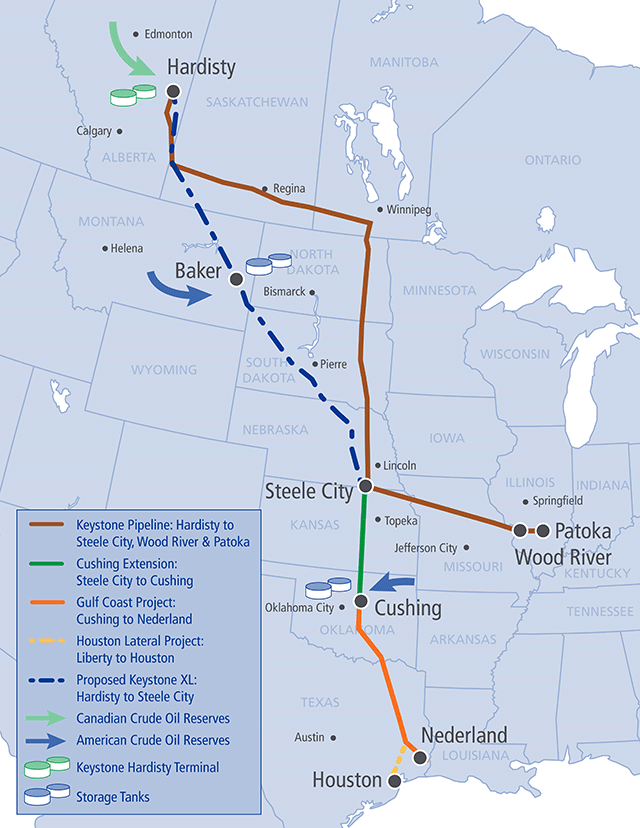The Senate is unable to override the president’s veto of TransCanada’s (ticker: TRP) Keystone XL pipeline
The Senate was unable today to override President Obama’s veto of a bill that would have allowed for the construction of the Keystone XL pipeline. President Obama vetoed the bill last month, saying the legislation “attempts to circumvent longstanding and proven processes for determining whether or not building and operating a cross-border pipeline serves the national interest.”
A bipartisan majority of senators was unable to reach the two-thirds majority required to undo a presidential veto. The vote was 62 to 37, just five votes short of the required 67, reports The New York Times. Despite vetoing the bill, the White House has said that President Obama will retain the authority to make a final judgment on the pipeline on his own timeline.
Congressional Republicans have not given up on passing legislation that will allow the construction of the pipeline, which has remained on hold since 2008. “We will continue working on this important infrastructure project,” said Senator John Hoeven, Republican of North Dakota, a lead sponsor of the Keystone XL measure. “Another option is to attach this legislation to other energy, infrastructure or appropriations legislation that the president won’t want to veto.”
Next Step for Keystone XL
Long time oil and gas industry expert Tom Petrie spoke about the Keystone XL pipeline debacle at EnerCom’s The Oil & Services Conference™ in mid-February. Petrie predicted that the legislation would eventually be approved by President Obama before leaving office in 2016. Referring to the idea of attaching Keystone XL to other legislation that the president favors, Petrie said, “I believe this is so necessary that I remain maybe perversely optimistic that this legislation will pass before this president is out of office.”
The battle over this pipeline has raged between environmentalists, politicians, oil and gas industry groups and TransCanada since it was proposed and applications submitted more than six years ago. TransCanada has launched public relations and advertising campaigns around the proposed pipeline during the period. In 2013, the company launched an ad campaign in direct response to environmental groups’ derogatory characterizations of the estimated $8 billion project.
Responding to 2013 comments by Ross Hammond, senior campaigner for Friends of the Earth, that Americans have experience being lied to by big oil companies, TransCanada’s James Millar said that oil only accounts for 13 percent of TransCanada’s business, according to an article in the International Business Times.
“We are always lumped into that big oil category. … The largest part of our business is natural gas pipelines, we deliver 20 percent of natural gas in North America,” Millar told the IB Times.
Millar took issue with the claim that the Canadian company does not have U.S. interests in mind.
“They [environmental groups] talk about us as a foreign company. Well, we’ve got 5,000 employees; half of them are in the U.S.; we have been there for decades. I don’t think any of those folks [workers] would appreciate being called foreigners,” Millar said.
TransCanada president and CEO Russ Girling went on the record last fall with lengthy comments in response to President Obama’s comments about Keystone XL. And economic development proponents and labor unions have lashed out at the president over his negative stance toward the pipeline.
Important disclosures: The information provided herein is believed to be reliable; however, EnerCom, Inc. makes no representation or warranty as to its completeness or accuracy. EnerCom’s conclusions are based upon information gathered from sources deemed to be reliable. This note is not intended as an offer or solicitation for the purchase or sale of any security or financial instrument of any company mentioned in this note. This note was prepared for general circulation and does not provide investment recommendations specific to individual investors. All readers of the note must make their own investment decisions based upon their specific investment objectives and financial situation utilizing their own financial advisors as they deem necessary. Investors should consider a company’s entire financial and operational structure in making any investment decisions. Past performance of any company discussed in this note should not be taken as an indication or guarantee of future results. EnerCom is a multi-disciplined management consulting services firm that regularly intends to seek business, or currently may be undertaking business, with companies covered on Oil & Gas 360®, and thereby seeks to receive compensation from these companies for its services. In addition, EnerCom, or its principals or employees, may have an economic interest in any of these companies. As a result, readers of EnerCom’s Oil & Gas 360® should be aware that the firm may have a conflict of interest that could affect the objectivity of this note. The company or companies covered in this note did not review the note prior to publication.







